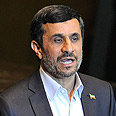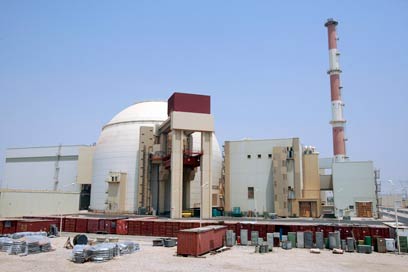
Russia and China are urging the chief UN nuclear inspector to scrap or delay US-backed plans to reveal intelligence on Iran’s alleged nuclear arms experiments, in a bluntly worded confidential document obtained Monday by The Associated Press.
The diplomatic note to International Atomic Energy Agency chief Yukiya Amano points to an East-West rift among the five permanent members of the UN Security Council over how to deal with concerns about Iran’s nuclear activities.
Related stories:
- Clinton to Iran: Don't misread departure from Iraq
The United States, Britain and France want Amano to share what his agency knows or suspects about Iran’s alleged weapons experiments with the IAEA’s 35-nation board at its meeting next month. But Russia’s and China’s opposition likely will delay Western hopes of having the board report Tehran to the Security Council for the second time for its nuclear defiance, a referral that could open Iran to more sanctions.
In the note, Moscow and Beijing warn Amano against “groundless haste” and urge him to “act cautiously,” adding that “such kind of report will only drive the Iranians into a corner making them less cooperative.”
An international official familiar with the matter said Amano plans to go ahead nonetheless, arguing that it is his duty to inform the decision-making board of evidence pointing to such experiments.

The Bushehr nuclear power plant (Photo: Reuters)
Russia, China, the United States, Britain, France and Germany are formally unified in trying to persuade Iran to meet concerns over its nuclear program. But a diplomat briefed on the matter said he was told that the Russians and Chinese went to Amano without consulting the other nations.
The diplomat suggested that the fractures within the group may hinder any new attempt to engage Iran in talks over its nuclear program. He, like others who consented to talk about privileged issues, asked for anonymity.
Asked about the Chinese-Russian note, chief US delegate Glyn Davies said Washington supports “IAEA’s efforts to address questions about the possible military dimensions of Iran’s nuclear program. The burden remains on Iran to answer the IAEA’s questions, which it has thus far refused to do,” he said.
'Report an excuse for more sanctions'
Iran is under four sets of UN Security Council sanctions for not mothballing a program that can make both nuclear fuel or fissile warhead material.
Tehran insists, however, it is only interested in nuclear power, not weapons. It says the intelligence is fabricated by the United States and its allies.
In its efforts to blunt pressure, Iran has found economic and strategic allies in both China and Russia. Since the IAEA asked for Security Council involvement five years ago, these two nations have supported UN and other sanctions only reluctantly and on condition they be watered down.
Meanwhile, the United States is seeking European support for tougher sanctions on Iran in response to an alleged plot to kill the Saudi ambassador to Washington, a senior US official said on Monday.
David Cohen, Treasury undersecretary for terrorism and financial intelligence, said he met British officials in London on Monday to discuss potential new sanctions focusing on Iran's access to the global financial system.
"Iran needs to be held accountable for this plot," Cohen said, referring to an alleged plan to assassinate the Saudi ambassador in a bomb attack, in which the Iranian government denies any involvement.
Any further sanctions would also be part of efforts to deter Iran from pursuing nuclear capabilities, Cohen added, and could target the country's central bank.
"We are going to continue to look at those financial institutions that are involved with proliferation activity for Iran and continue to try to isolate them from the international financial sector," Cohen said.
AP and Reuters contributed to this report
- Follow Ynetnews on Facebook
- Receive Ynetnews updates
directly to your desktop















